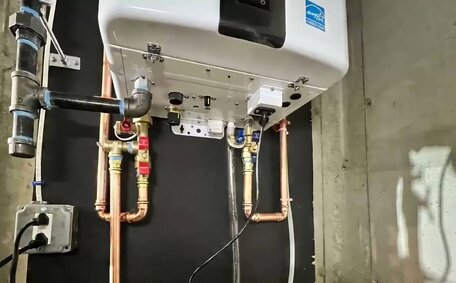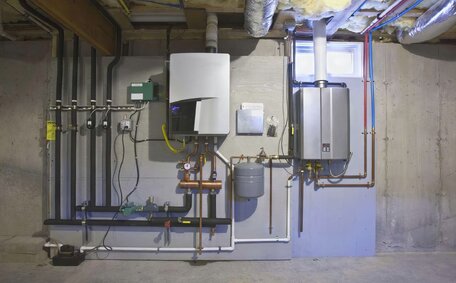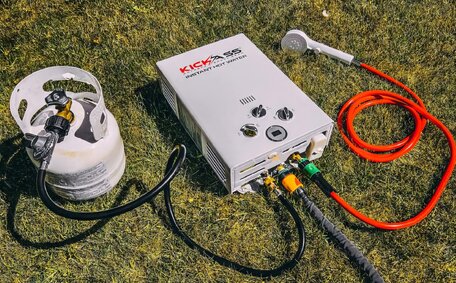Assessing Your Skills and Knowledge Before Attempting DIY Repairs
Prior to commencing any hot water system repairs, critically evaluate your skills. Minor errors can escalate into significant risks like gas leaks, electric shocks, and carbon monoxide poisoning.
Evaluate your confidence in handling complex components such as gas lines, electrical circuits, and water pressure systems. Do you understand relevant building codes and safety procedures? Reflect on your success rate with past plumbing repairs of a similar nature.
Be realistic - if you’re lacking the expertise, specialised tools, or confidence, it’s essential to call a professional to avert safety risks and prevent further damage. No matter how small the issue seems, DIY hot water system repairs can quickly escalate beyond many homeowners’ capabilities.
With about 65% of emergency insurance claims resulting from failed DIY repairs, it raises concerns about the cost-effectiveness of self-repair efforts. Routine water heater maintenance mitigates the need for urgent DIY fixes that often do more damage.
An honest skill assessment helps decide whether to DIY or hire a professional for safe and reliable hot water heater repairs.
Identifying Different Hot Water System Types and Components
There are three main types of hot water systems found in most homes:
Gas Hot Water Systems
Gas water heater systems heat water in a storage tank using natural gas or LPG. Key components include:
- Gas valve and burners to heat the water
- Flue for gas exhaust
- Storage tank to hold heated water
- Anode rod to prevent corrosion
- Temperature and pressure relief valve as a safety precaution
Gas systems need adequate ventilation; improper maintenance can result in dangerous carbon monoxide leaks.
Electric Hot Water Systems
Electric systems also rely on a water tank for storing heated water. However, water is heated by electric heating elements instead of gas burners. Components include:
- Electric heating elements
- Thermostats to control temperature
- Insulation around the storage tank
- Anode rod and relief valves
The primary risks with electric water heater systems are the potential for electric shocks. It’s essential to ensure electrical systems within the heater remain unexposed to moisture.
Solar Hot Water Systems
Solar water heaters use free heat from the sun. Water flows through solar collector panels before reaching the insulated storage tank. Key parts are:
- Solar collector panels
- Pump and controller unit
- Insulated storage tank
- Backup electric heating elements for cloudy days
Solar systems require little maintenance but leaks can still occur. Check insulation, seals, and valves periodically, especially if you’ve considered diy water system maintenance.
Identifying your water heater type and familiarising yourself with its layout and components is an important first step. This enables a more accurate assessment of the feasibility and risks associated with DIY plumbing repairs efforts.
Recognizing Common DIY Hot Water System Repair Issues
Lack of Hot Water
A frequent water heater issues that could entice homeowners into DIY repairs is the distressing scenario where there’s a lack of hot water, indicative of underlying plumbing issues. This could indicate problems your unit is facing, such as:
- Faulty thermostat or heating element not heating properly
- Sediment buildup within pipes or the storage tank
- Leaking pipes causing the water your taps dispense to cool before use
- Failed gas valves on gas systems
Strange Noises
Banging, rumbling, or hissing noises often indicate problems requiring careful consideration before concluding an attempt at system repairs.
- Issues where pressure can cause buildup, leading pipes to rattle
- Sediment or blockages vibrating within the storage tank or pipes
- Failing components like valves, heating elements or anode rods
An annual system flush can help prevent any plumbing sediment issues from accumulating over time. But for hot water repairs, it’s crucial to know when call a professional for thorough inspection and meticulous repairs.
Understanding the Safety Hazards and Risks of Improper Repairs
Potential Property Damage
DIY hot water heater repairs without required expertise can lead to gas leaks, water damage, and electrical fires, with minor mistakes risking major property damage.
Risk of Personal Injury
Improper repairs can cause electrical shocks, carbon monoxide poisoning, and severe burns, potentially leading to long-term injury or fatality.
Other Dangers
Beyond property damage and physical harm, botched repairs can void manufacturer warranties, increase costs for professional repairs later on, or result in legal issues with regulatory bodies or your insurance provider.
Given the risks associated with water heaters, enlisting a professional is advisable. The potential risks of DIY water heater repair simply aren’t worth it.
Electrical Shocks and Electrocution
Electrical Risks of Hot Water Heater Repairs
Assessing whether repair electrical components as part of a DIY project in a hot water system is crucial due to the severe risk of electric shock or electrocution. Power must be disconnected at the circuit breaker before attempting any repairs to eliminate this danger. Furthermore, even with the power off, live wires could retain a dangerous residual charge.
Amateur repairs can dangerous, often leading to loose connections, exposed wires, faulty grounding or damaged insulation. Each of these issues can result in an electric shock. Consequences can vary from painful shocks to grave burns, loss of consciousness, organ injury, or even death in the most dire cases.
Consequences of Electrocution
Besides excruciating pain, electrical shocks can leave disabling injuries or permanent nerve damage. Brief unconsciousness usually follows any significant electrocution. In serious cases, the jolt can trigger cardiac arrest and prove fatal.
Special caution should be taken during winter months, as children, seniors, and those with heart conditions face heightened risks of life-threatening complications. However, heater issues can cause all your household members, even healthy adults, to suffer severe burns or traumatic injuries from muscle contractions and falls caused by electric shocks.
Clearly, the hazards of DIY water heater repairs, especially when mishandling electrical components, pose catastrophic risks. Always enlist a qualified electrician to ensure your safety.
Gas Leaks and Explosions
The Dangers of Gas Leaks
DIY plumbing without proper training can result in hazardous gas leaks from highly flammable fuel lines.
Warning signs of a leak include the smell of gas, visible vapours, unusual noises from pipes, or dirt blowing from vents. If you detect a gas leak from your water heater while doing DIY checks, evacuate immediately and call emergency services.
Risk of Explosions
Gas leaks pose a severe explosion hazard if fuel accumulates around an ignition source. The results can be catastrophic — destroying property, causing severe burns, and even proving fatal.
Gas water heaters use a pilot light to ignite the burners, which can go out without proper attention. Improper maintenance can damage your system, causing this small flame to go out and allowing gas to pool until reignited. This can cause a sudden, violent blast.
Professional Help is Crucial
In light of the severe risks, professional assistance is critical for gas line and pilot light issues. Avoid reckless DIY attempts; instead, ensure safety by engaging certified professionals.
Carbon Monoxide Poisoning
The Silent Killer: Carbon Monoxide
Carbon monoxide, an undetectable gas, can be fatal if released from improperly vented or maintained gas water systems.
Improper venting, often due to amateur work, can lead to a dangerous build-up of carbon monoxide, mimicking flu symptoms but with potentially fatal outcomes.
The undetectable nature of CO necessitates annual inspections to avoid deadly consequences. Professional servicing is crucial to mitigate this 'silent killer.'
Scalding and Burns
Attempting DIY repairs on your hot water system without proper knowledge can put your safety at risk of accidental scalding and burns. Should the heater’s temperature or pressure relief valves fail due to poor maintenance or faulty installation, hot water can discharge unexpectedly from taps or shower heads.
Water heaters normally operate at temperatures up to 75C to kill bacteria. However, this high heat also poses dangers - a mere 5 seconds of exposure to 60C water can cause third-degree burns. Faulty thermostats may also allow unsafe temperatures.
In addition to adhering to safe isolation procedures before working on any system, correctly reassembling valves and safety components after you repair your unit is absolutely critical. Any errors leave your family’s safety compromised, vulnerable to painful, disfiguring injuries.
Don’t take risks with your DIY repairs; enlist the support of a licensed plumber for complex systems you don’t fully understand. Protect your household by hiring a licenced professional you can trust to ensure safe operation.
Chemical Exposure
Older hot water systems or tanks often use materials and chemicals that can pose health hazards if mishandled during DIY repairs. Galvanised steel tanks require rust inhibitors, while glass lined tanks use special bonding chemicals.
Exposure to these substances when draining tanks or attempting repairs can cause skin irritation, breathing issues or other symptoms. Proper protective gear is essential, however mistakes still occur even with precautions in place.
DIY repairs without understanding water treatment and safety can alter water chemistry, risk contamination, and disturb sediment with harmful metals.
To avoid chemical burns or toxicity, it’s best to have your hot water system serviced by qualified technicians. They follow strict procedures to safely handle any dangerous substances while keeping your family protected.
Weighing the Costs and Benefits of DIY vs Professional Repairs
Despite the allure of cost-saving, the risks of DIY hot water repairs are often not worth it. A professional plumber provides invaluable expertise, diagnosing and fixing issues correctly from the onset.
Professionals have the expertise and resources to maintain your plumbing safely, following regulations to prevent leaks and electrical or gas hazards.
Although minor DIY tasks like replacing thermostats are manageable, more complex issues require advanced technical skills.
Failed DIY repairs often result in wasted time, money and effort, with subsequent professional services significantly increasing costs. For household safety and long-term value, it’s more prudent to hire a better plumber who’s certified and professional from the start.
Impact of Faulty Repairs on Warranties and Insurance
DIY tinkering can void your warranty, risking high repair costs. Warranties typically mandate servicing by qualified technicians.
Damages caused by improper repairs may also not be covered under homeowners insurance. Policies typically exclude “gradual damage” from lack of maintenance as well as damages resulting from unlicensed or DIY work.
Before tackling any complex repairs yourself, check warranty terms and confirm insurance coverage. Considering the prospect of future costs for repairs or investing in a new system, and the potential lack of protection, it’s clear those short-term savings from DIYing fixes might not be as economical as one might hope.
Working with skilled professionals ensures repairs meet codes and avoid insurance and warranty issues, with many offering labour warranties.
Best Practices for Maintaining Your Hot Water System
Make sure to conduct regular maintenance, crucial for prolonging your hot water system’s lifespan and preventing costly repairs down the road. Here are some best practises homeowners can follow:
Flush The System Annually
Sediment accumulation can reduce efficacy, and overheating can occur in your water heater absent consistent upkeep. Flushing once a year clears out deposits. Capture drained water in buckets until it runs clear.
Ensure your system operates efficiently by turning off power, connecting a hose to the tank valve, and opening the pressure relief to flush out sediment.
Inspect The Anode Rod
Test Temperature and Pressure Relief Valve
Annually test TPR valves to confirm your system’s safety, a vital indicator for when to engage a professional to avert potential explosion risks.
While some basic tasks are safe for skilled DIYers, issues with heating elements or thermostats require professional expertise for dependable maintenance.






